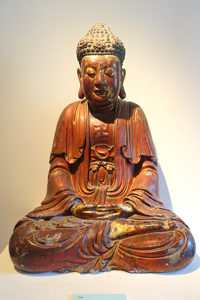by Grace Love ’19

Mahayana Buddhism is the largest form of Buddhism in the world (about 53% of 520 million Buddhists). Buddhism began in India between the 6th and 4th centuries BCE and is based on the teachings of the original Buddha (known also as Gautama Buddha and Siddhartha Gautama). Buddhist religious knowledge comes from four sources: 1) the scriptures—including the sutras and other writings containing truths or insights; 2) the Sangha—a tradition of monks or devotees who have reached enlightenment and can help or teach others; 3) the Dharma—the doctrine or set of directions for proper and positive living in Buddhism; and 4) the Buddha himself, who serves as an example. Buddhist traditions focus on achieving enlightenment and becoming like the Buddha. Often Buddhism becomes mixed with regional traditions and beliefs in different countries. This mixing is why Vietnamese Buddhism, discussed below, incorporates such features as ancestor worship.
Buddhism gave Anna Duong-Topp (’21) a reason to live. Her mother is Episcopalian, but her father practices a Vietnamese style of Buddhism. Anna has warm memories of shrines and offerings for their ancestors alongside incense and prayers in front of Buddha statues.
Ms. Duong-Topp had always respected both of her parents’ beliefs, but had, as early as age ten, begun to lean more towards her paternal heritage. When she ended up hospitalized at 12 due to complications from anorexia nervosa, her whole world changed. She says that when she was almost dying, she realized she needed to change her relationship with God. She found that Buddhism had a lot of answers and tools to allow her to grow and connect with something larger than herself.
Typically, Buddhist teachings do not center around a deity, but Anna doesn’t think that the concept of a God goes against these teachings. The way she perceives God is in the sense of a connectivity among all living things and the way life and the world are harmonized. She sees God as truth. Part of why her tradition helped Anna get through her time of suffering was the way the Four Noble Truths of Buddhism deal with hardship. They teach that suffering is inevitable and necessary; that it is something to be overcome and learned from. Being able to control her interpretation of negative influences on her life helps to embolden Anna. By following Buddhist thought and finding fulfillment in it, Anna has found that she has changed for the better.
Practicing her religion brings Ms. Duong-Topp joy every day. When she thinks of the dharma and of Buddhism in general, Anna sees them as references to a lifestyle and a commitment to betterment. She does what she can to maintain her rituals and traditions while on campus and engage with her faith regularly. She especially likes studying and chanting the Lotus and Heart Sutras. The most common image of Buddhism in the West is of meditation for stress relief and calming. For Anna, meditation is a spiritual experience that, while both renewing and important, is only one of an expansive set of beliefs and practices. It gives her a sense of inspiration and fulfilment to be a student of the Eightfold Path, a series of steps leading to spiritual enlightenment. Her journey, however, has been a gradual one. As a matter of fact, it wasn’t until a few years ago that she began to incorporate her religious identity enough to be open about it.
Now Anna wants to be visible and outspoken about her tradition. She wants to share her truth. When it comes to engaging in religious discourse, Anna says she has “so many reasons to, and no reason not to” be involved. She wants to dispel misconceptions and believes that interfaith work is about understanding. Rather than seeking to make a homogenous mixture of beliefs or find universal truths, Anna wants to explore the unique ways that people approach life and faith.
“This is my truth. I recognize you as a beautiful person and I want to learn your truth.”
Leave a Reply